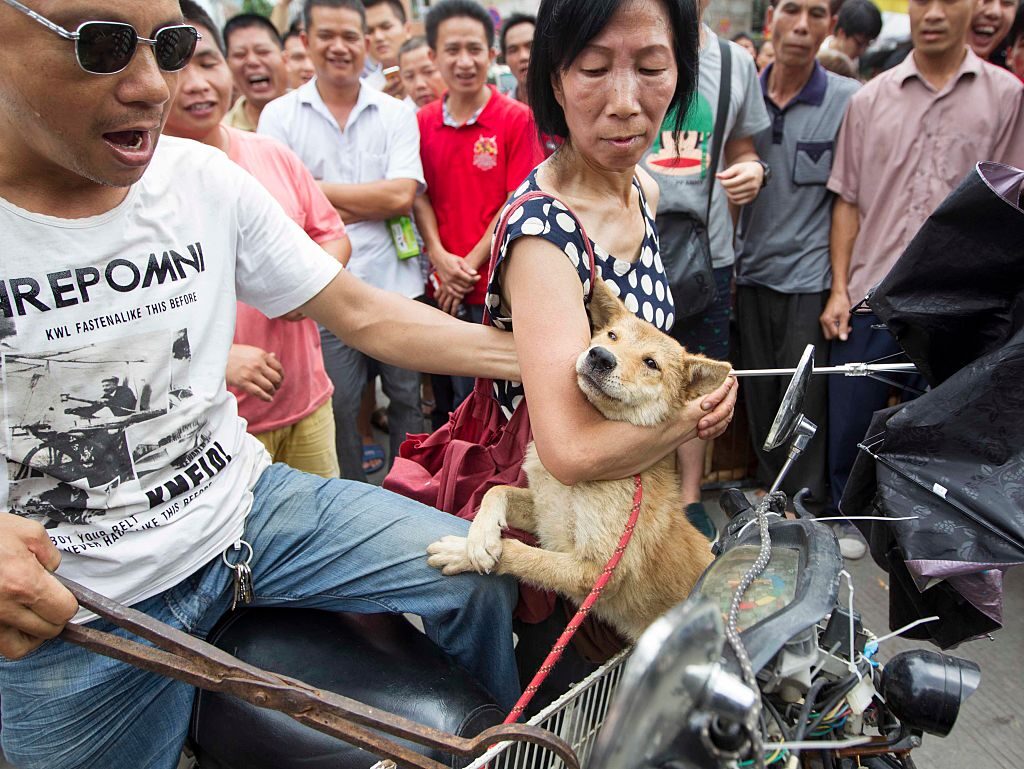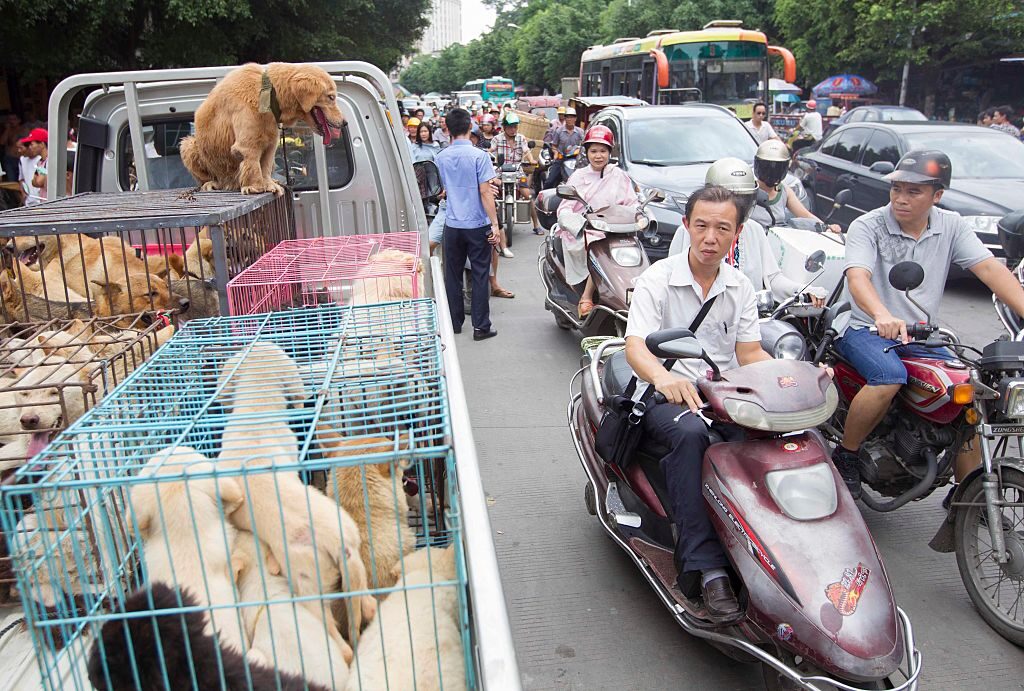The results of a survey published by two animal rights organizations this week found that eating dogs is highly unpopular in the city of Yulin, China – home to a gory spectacle in which dog traders mark the summer solstice by butchering thousands of dogs in the streets and eating their meat with lychees.
Dog butchers argue that the Yulin Dog Meat and Lychee Festival, expected to begin on June 20 this year, is part of a longstanding regional tradition and have in the past argued that eating dog meat was a natural way to fight the summer heat. In reality, experts from the from Humane World for Animals told Breitbart News this week, the festival was only established in 2010 and does not cater to local tastes, but rather a minority of “dog meat enthusiasts” and contrarians seeking to “provoke, or even disgust, animal lovers.”
“Dog meat consumption in China is largely supply-driven, promoted by traders rather than sustained by cultural or household demand. It is not a staple food in Chinese homes,” Dr. Peter Li, Humane World for Animals’ China policy expert, emphasized in comments to Breitbart News on Wednesday.
Adding to the horror of the festival is the fact that many of the dogs caged and butchered in public are pets stolen from homes. The national Chinese government banned the raising of dogs as livestock in 2020, at a time in which Chinese officials publicly claimed that the origin of the Wuhan coronavirus, a novel pathogen that ultimately triggered a devastating pandemic, was “the wildlife sold illegally in a Wuhan seafood market.” The Chinese Communist Party has since pivoted to blaming American military facilities, without evidence, for the pandemic, and falsely claiming that the. virus originated in Maryland – but rules limiting the breeding of dogs for food remain in effect.
File/A vendor threatens to kill the dogs if the activities do not pay the price at a free market ahead of the Yulin Dog Eating Festival in Yulin city, south China’s Guangxi Zhuang Autonomous Region on 20th June 2014. ( Jie Zhao/Corbis via Getty Images)
Banning the raising of dogs as livestock triggered no significant, visible public outcry since, as many animal rights activists emphasize, eating dog meat is not a widespread cultural practice in China.
Humane World for Animals published a survey on June 3, conducted by its partner Chinese animal rights organization Vshine, asking Yulin residents about their attitudes towards eating dogs and cats. A whopping 87.5 percent of respondents said they “never or rarely” eat dog or cat meat and slightly more, 88 percent, said that banning dog and cat meat trading would have “no impact” on their lives.
Only 12.5 percent of those inquired said they eat dog or cat meat at least one a week or once a month.
The lack of local interest in eating these animals leaves open the question of who the target clientele is for the upcoming slaughter and who benefits.
“Chinese tourists are no longer the primary consumers during the Summer Solstice—which the traders made the day of the ‘festival’ to make it sound traditional but is now effectively defunct,” Dr. Li of Humane World explained. “Since then, most consumers are local dog meat enthusiasts and a shrinking number of Chinese visitors who partake in the practice as a form of defiance—intended to provoke, or even disgust, animal lovers, both in China and abroad.”
The original target consumers, he added, were Chinese tourists from outside of Yulin, but “that support very quickly fell apart when the horrific spectacle became evident, and since 2014, the authorities have actively distanced themselves.”
File/Dogs to be killed are caged at a free market ahead of the Yulin Dog Eating Festival in Yulin city, south China’s Guangxi Zhuang Autonomous Region on 21th June 2014. (Jie Zhao/Corbis via Getty Images)
Chinese state media outlets initially defended the Yulin festival, celebrating it even in English-language publications. In 2014, for example, the English-language Global Times falsely claimed that the festival “formed spontaneously in the 1990s” and that Chinese people have eaten dogs “since ancient times.”
“The dog meat festival is a custom and business-oriented event, and shouldn’t be labeled as a brutality,” the Global Times, often a mouthpiece for the opinions of the Chinese Communist Party, declared at the time.
This attitude changed dramatically as Western animal rights activists, including high-profile celebrities, launched a campaign against the festival. In 2015 and 2016, celebrities such as Ricky Gervais and Paris Hilton lent their voices to a campaign against the festival. Congress took up the issue in 2016, welcoming reality television star Lisa Vanderpump to testify against the festival.
The Chinese government dealt with the problem by spreading rumors in 2017 that the festival had been canceled, which were not true. The Global Times published photo essays of courageous human rights activists rescuing dogs in Yulin. The attention on the festival dissipated, but the event continued to take place.
File/Activists protest and try their best to save dogs are caged at a free market ahead of the Yulin Dog Eating Festival in Yulin city, south China’s Guangxi Zhuang Autonomous Region on 21th June 2014. (Jie Zhao/Corbis via Getty Images)
“The continued existence of this trade, which represents a minuscule fraction of China’s vast GDP, is largely due to the government’s tacit acceptance of traders’ exaggerated claims which falsely frame the trade as a traditional livelihood that contributes to economic growth and job creation,” Dr Li told Breitbart News. “Although neither of these claims is demonstrably true – the dog and cat meat trade’s contribution to the economy and jobs is negligible- these are factors closely tied to regime stability and therefore this trade continues largely unchallenged.”
Li explained that the national Chinese government “derives little overall benefit” from the trade, but “at a local Yulin government level the trade provides employment to poorly educated, unskilled workers who, often exposed to animal slaughter from childhood in rural China, are prepared to do the gruesome work of killing, gutting and butchering cats and dogs.”
“By absorbing these workers, the local authorities are essentially relieved of the burden of finding alternative employment for these people and so this could lead them to accepting the status quo,” he observed.
Li noted that moving many of these workers into other fields proactively, countries where dog-eating has persisted can slowly eliminate the practice, highlighting South Korea as a success story. The South Korean National Assembly banned the dog meat industry, including the breeding of dogs for food, in January 2024. While facing some resistance from those in the trade, many South Koreans enthusiastically celebrated the end of a brutal industry.
“As we have seen in South Korea where a dog meat industry ban was passed in 2024, if a government takes decisive action to support the business transition of dog meat traders to alternative sustainable livelihoods, it is entirely possible to dismantle this trade,” Li noted, citing Human World’s work in “providing a working blueprint” to transition dog meat workers into other fields through its Models for Change program.





